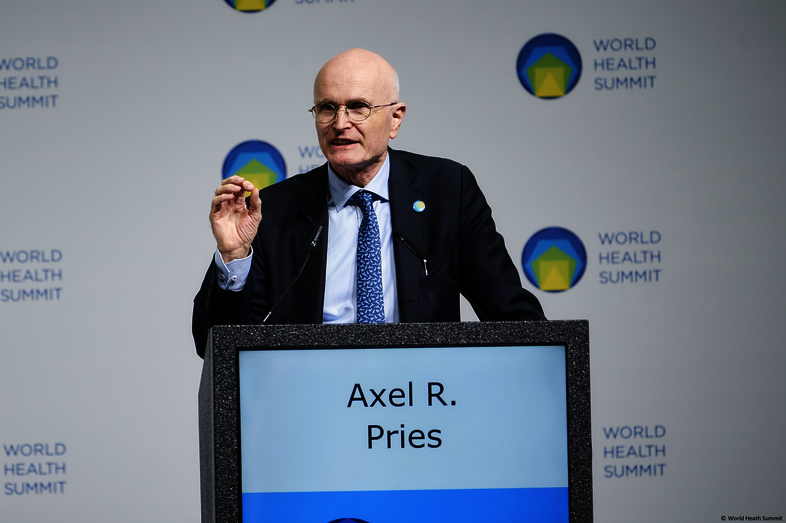Interview | Prof. Dr. Axel R. Pries, Präsident of the World Health Summit

Prof. Dr. Axel R. Pries is conference president of the World Health Summit (WHS). The physician and physiologist was director of the Institute of Physiology at Charité - Universitätsmedizin Berlin from 2001 to 2015. From 2015 to 2022, he was dean and member of the board of Charité and interim head of the Berlin Institute of Health. At the same time, he has been involved in various international and European institutions. He has been president of the World Health Summit (WHS) since 2021. We spoke to him about the development and topics of the WHS and Berlin as the venue for this international conference.
1. The World Health Summit (WHS) was held in Berlin for the first time in 2009. You have been president since 2021. Are you satisfied with how the conference has developed over the past 14 years?
The WHS has made great progress since it was founded in 2009 to mark the 300th anniversary of Charité. The beginnings were comparatively modest, and it was not expected to become so big. Although, considering the name, this was perhaps not entirely ruled out when the organization was founded. In fact, under its founder Detlev Ganten, the WHS managed to live up to its name in the first twelve years. Today, we can look back on a conference that is not just a conference, but also a platform where things are developed and communicated. The Who's Who of the international global health community comes together at the WHS in Berlin to find new approaches in ongoing discussions.
Despite this positive development, we want to continue to expand the WHS. For example, we are now active throughout the year and do not just focus on the World Health Summit in October. We are developing more and more in the direction of a think tank or an engine for developments in the field of global health.
2. This year, the WHS was held under the motto "A Defining Year for Global Health Action". What exactly makes this year so special?
This year, many international political bodies - such as the UN, G7, BRICS and G20 - made decisions that are relevant to global health. For example, the United Nations (UN) held a week of high-level meetings in September, at which globally relevant topics were addressed. Three of these topics dealt with health - pandemic preparedness, tuberculosis and universal health coverage. This shows that health plays a very important role internationally.
With regard to pandemic preparedness, the results of these meetings include the following: On the one hand, health is a result of economic, ecological and social conditions, but on the other hand, it is also an indicator of good social and economic conditions. In this sense, societies that enable people to enjoy comprehensive health are also societies that function well across the board, and health problems are indicative of social problems. Many relevant decisions have also been prepared and taken this year regarding the financing of global health, such as the work of the World Health Organization (WHO). Overall, we can therefore speak of a groundbreaking year for global health.
3. Can you already give us a preview of the topics for 2024?
At the WHS, the topics are identified and selected in discussions with our international partners. Many topics in the field of global health are permanently topical, such as those just mentioned: pandemic prevention, tuberculosis control and global healthcare. These are, of course, areas that will continue to occupy us.
In the coming years, however, I expect a stronger focus on the digital transformation, for example. As far as this is concerned, we have already significantly expanded the range of topics this year and will include this even more in the program in 2024. There is also the increasingly urgent question of how we deal with the effects of climate change on global health. Topics that have been somewhat pushed into the background by the pandemic, such as non-communicable diseases like cardiovascular diseases and mental health or antibiotic resistance, will also receive more attention again in the future. Finally, there is a great need for action at the meta-level, for example on the question of the framework conditions for health and global inequalities in healthcare. Many of our formats will probably focus on these areas.
4. What role does Berlin play as the venue for the WHS?
Berlin is the ideal base for such a conference. The city is open and diverse in a positive sense - just like the WHS. German politics, and therefore the capital city of Berlin, also provide important impetus for global health. Examples include the compensation of WHO funding by Germany following the withdrawal of the USA and the establishment of WHO's Global Hub for Pandemic and Epidemic Intelligence in Berlin. For the WHS, the city is an ideal place to make a contribution to global health.
On the other hand, Berlin was and is a city of health. Since the times of Virchow, scientific discoveries that have led to groundbreaking innovations have been made here. This also resulted in a relevant part of Berlin's economic strength. These innovations were accompanied by improvements in national and international healthcare, which have earned and continue to earn money for local companies. In the HealthCapital Berlin-Brandenburg healthcare industries cluster, there is a very positive environment for innovations in the healthcare sector. There are many start-ups and large institutions that make the city a lively hotspot for the healthcare industry. The city should make much more energetic use of this potential.
Related links:
- https://www.worldhealthsummit.org/
- Axel R. Pries CV: https://www.worldhealthsummit.org/media/presskit.html#c112570



